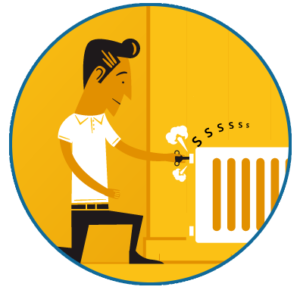Boiler Broken? Here’s What You Need To Do
A misbehaving or broken boiler is, to put it mildly, inconvenient, but it could also be dangerous. If you suspect a gas leak then you need to contact the Gas Emergency Services as soon as possible as this could be a gas emergency:
- Smell gas in England? Call 0800 111 999
- Smell gas in Scotland? Call 0800 002 001
- Smell gas in Wales? Call 0800 002 001
- Smell gas in Northern Ireland? Call 0800 002 001
If you don't smell gas, but your boiler isn't quite right, then please take this seriously - it's very important that you don't try to fix your boiler on your own. It's not only dangerous but may invalidate any warranty or insurance policy that you have.
To find a qualified and highly rated engineer in your area, use our free service to get quotes for a new boiler today.
Jump straight to the help you need with your broken boiler…
- Simple checks for broken boilers
- Coping with a broken boiler
- Why you should never ignore a broken boiler
- Get free quotes to fix your broken boiler

Common signs of a broken boiler
A broken boiler will leave you without heating and hot water. Something that you're sure to notice more or less straight away. However, there are few more signs of a broken boiler too:
- An orange/yellow pilot light (it should be blue)
- Banging, clanking or tapping are not happy boiler noises
- Failure to maintain a steady pressure (usually too high)
- It's burning through an unusually high amount of gas
Note: Modern boilers have electric ignition with no pilot light.
Simple checks for broken boilers
As we've said, you should NEVER attempt to fix a broken boiler yourself. However, there are a few simple checks you can make before calling a qualified heating engineer.
Electricity supply
Check your electrical supply and ensure that your boiler is still plugged in. If it is, but you have no power, you should contact your electricity supplier. If there has been a power cut recently it is possible the boiler's clock has reset and lost your preferred settings.
You should be able to reset and run a little experiment; ask it to kick into action in 10 minutes time and wait to see if it sparks into life!

Fuel supply
For anyone with a gas boiler, the easy way to check your gas supply is to find out whether other gas appliances (such as the stove) are working. You could also ask a neighbour if their gas supply has been affected too.
If the gas stopcock is on but no gas is coming through, you have a gas supply problem and need to call your gas supplier.
Those in off-grid properties which store oil or LPG should check the level of fuel in the tank. This is normally automatically monitored by your supplier who will contact you when the level of fuel left in the tank drops to about a third.
Water supply
Check that your water supply is still turned on. You can simply do this by running taps around your home. If you find a problem, contact your water provider.
Boiler pressure
Take a look at the pressure gauge on your boiler. The typical range for modern boilers is 1.0 - 1.5 bar – always check the manufacturer's instructions in the manual that came with your boiler.
If the boiler pressure is too low then follow your manufacturer's instructions to refill and restart your system. If your boiler pressure is at the correct level either you have a gas supply problem or you will need a Gas Safe registered engineer.
Broken thermostat
Make sure your central heating programmer is in the 'on' position and your thermostats are turned up above room temperature. If the system works based on a timer it may be that the clock has gone forward or backward and just needs a tweak.
Frozen pipes
In very cold weather the condensate pipe that carries the condensation outside could freeze. This blockage causes the water to fill up the boiler and triggers automatic shutdown.
This is best solved by an engineer but you may want to try and resolve this by pouring hot – NOT boiling – water onto the end of the pipe. You could also try applying a hot water bottle or heat wrap to the pipe then switching the boiler on and off again.
Air in radiators

Should your boiler fire up when you turn the heating on but the radiators aren't warming up then they may need bleeding.
Bleeding the radiators is the process of giving an escape route to any air that's trapped in the system. This is important to do as air in the heating system can block the hot water from circulating around the radiators.
It's possible to bleed radiators yourself without the need for a heating engineer – follow our guide to bleeding radiators. However, if you have any doubt about what you're doing then don't hesitate to call a professional.
Look for an error code
To help you find the problem with your broken boiler, modern boilers will display an error code. These error codes will appear on the digital display and are usually a letter followed by a series of numbers.
All boiler manufacturers come up with their own error codes which can vary from model to model. So you'll need to take a look in the handbook that came with your boiler to find out what the error code means.
We've found some of the common error codes shown by the most popular boiler brands in the table below.
| Boiler manufacturer | Error code | What it means |
|---|---|---|
| Baxi | E133 | Frozen condensate pipe |
| Ideal | L1 | Lack of water flow or flow temperature overheat |
| Vaillant | F75 | Issue with the pressure sensor |
| Worcester Bosch | EA | Gas supply issue, flue blocked, frozen condensate |
Coping with a broken boiler
Hopefully your boiler will be back up and running in no time but if you have to cope without a boiler for a little while, here are a few tips.
Coping with no heating
- Use portable heaters in the most popular rooms
- Close the curtains
- Keep the doors to empty rooms shut
- Put another layer on
- Seal up gaps around windows and doors
- Round up the hot water bottles and electric blankets
Coping with no hot water
Let's start with some good news…
- If you have a hot water cylinder with an immersion heater you will still have access to hot water as it is powered by electricity
- Electric showers will still have hot water
- Modern washing machines heat water by themselves so they can still wash clothes.
No immersion heater or electric shower? Then it might be time to boil some water in a saucepan or kettle for washing yourself or the dishes. Remember to let it cool down a bit first though!
If all else fails, ask neighbours, friends and family for help.
Never ignore a broken boiler
Ignoring a broken boiler can lead to some fairly severe consequences. The potential dangers of a broken boiler include a carbon monoxide leak or even an explosion. While these are rare – explosions in particular – they can still happen if you're living with a broken boiler. In addition, it's very dangerous for very young and very old people to be without heating and can lead to illness.
A broken boiler that leaks Carbon Monoxide (CO) in your home could be deadly!
Depending on the severity of the leak, the consequences of CO poisoning can take place in small amounts over a period of time or could have a severe impact within minutes.
CO is the most common cause of death by poisoning in Britain. According to the NHS, around 200 people attend A&E as a result of CO poisoning every year, with approximately 50 of these cases resulting in death.
Symptoms may be flu-like and include:
- Headaches
- Dizziness
- Nausea
- Shortness of breath
- Confusion
Mild cases can be treated by a GP but high exposure requires an immediate visit to A&E and may leave long term damage.
Make sure you're in the know by learning more about the dangers of Carbon Monoxide with our Carbon Monoxide Safety Guide.
If you and other members of your household (or workplace) are experiencing possible symptoms that are worse when you are at home, when the heating is on, or lessen after time away from home, CO poisoning may be the cause.
More information is available from the NHS website but if you suspect there is a leak in your home you should:
- Turn off all appliances
- Open doors and windows for ventilation
- Evacuate (and don't go back inside until advised it is safe to do so by a professional)
- Call the Gas Emergency Services: 0800 111 999 in England, Scotland and Wales or 0800 002 001 in Northern Ireland
- Seek immediate medical advice, even if you are not presenting symptoms
Broken boiler? Find a local heating engineer now
We are ready to help get your broken boiler working again as quickly as possible. Simply take a moment to complete our simple online form – letting us know your boiler is playing up – and up to 3 fully-qualified heating engineers will soon be in touch to give a free quote.
Comparing multiple quotes in this way will greatly increase your chances of finding the right person for the job at the most competitive price.



